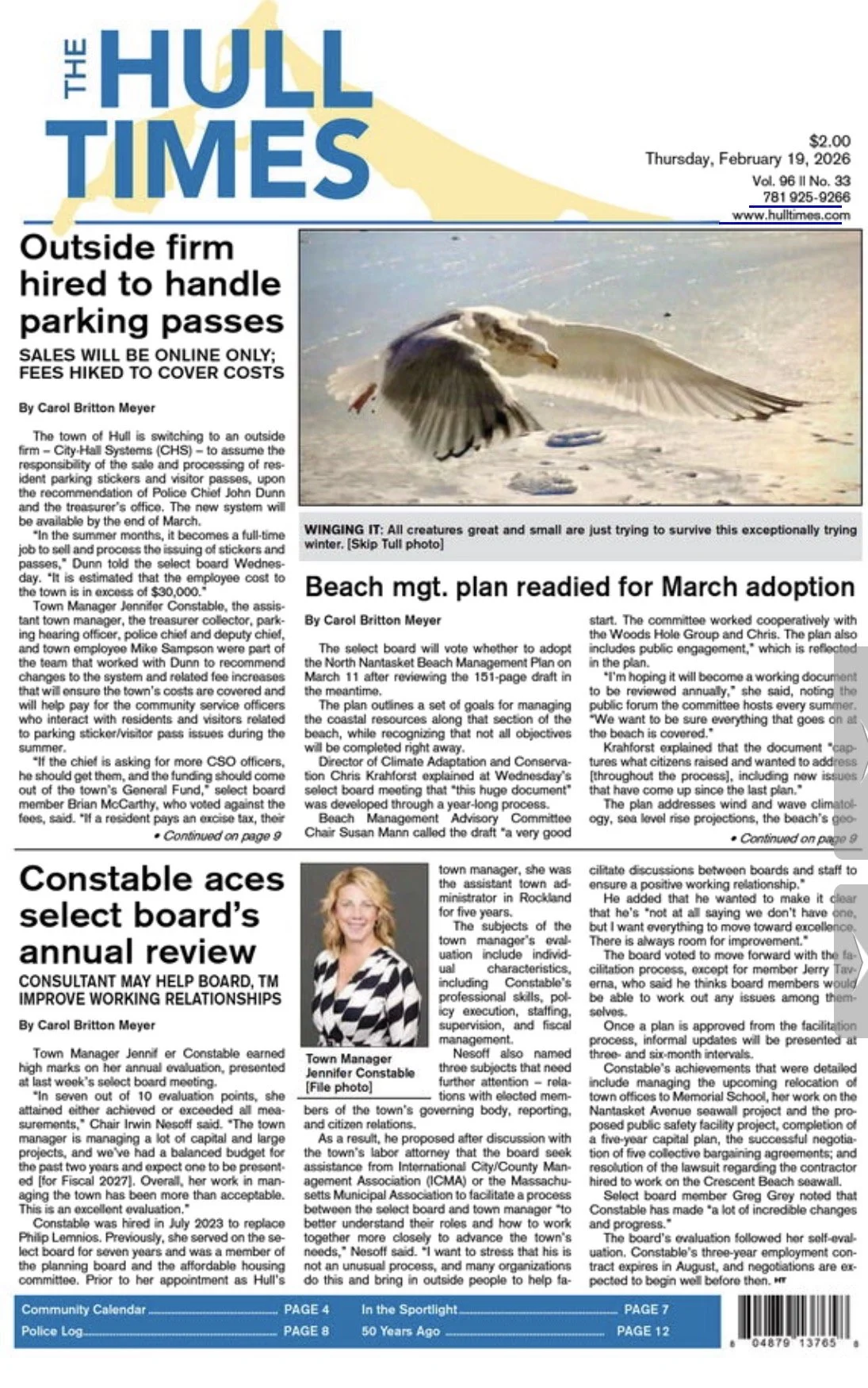Town-owned parcels identified as potential affordable housing sites
/By Carol Britton Meyer
Parcels on Gosnold Street, the land next to St. Nicholas Church on Spring Street, and the parking lot at XYZ Streets have been identified as vacant town-owned land potentially suitable for the development of affordable housing.
Consultants Jennifer Goldson and Noah Harper presented the results of a recent grant-funded town land feasibility study – which included only parcels larger than one-half acre – to the affordable housing committee last week.
THE SITE OF THE VILLAGE SCHOOL, shown at left next to the current St. Nicholas United Methodist Church on Spring Street, has been vacant since the building was taken down after the Memorial School was built. it is being considered as a lcoation to build affordable housing units. [Postcard courtesy of the Hull Historical SOciety]
“The consultants used information from the town’s housing production plan to identify the parcels, did a quick survey of all the properties to determine which ones could be appropriate for affordable housing, and came up with seven properties,” Irwin Nesoff, the select board’s liaison to the committee, told The Hull Times. “They did a deep dive on those parcels and highlighted three that could be used for this purpose.”
The Village and XYZ sites are considered more suitable, he said, because they are flat and already cleared, while the Gosnold parcel, consisting of several lots that could be combined into one, is wooded and would require removal of a large number of trees.
The Spring Street land has been empty since the former Village School was taken down after the Memorial School was built; the XYZ Streets site is the current municipal parking lot.
No conclusions reached as yet
“The meeting was for informational purposes only and no decisions have been made,” Nesoff said. “The purpose of the study was to inform the AHC so they can make a recommendation to the select board. There was no discussion about developers or whether such units would all be affordable or a mix of affordable and market-rate.”
Three members of the public attended the meeting.
“There were no concerns voiced,” Nesoff said. “There were mostly questions about the sites, and the difference between a [Chapter] 40B comprehensive permit and a friendly 40B, which is one possibility.”
With a so-called “friendly 40B,” the town works with the developer, whereas with a typical project proposed under Chapter 40B, developers are allowed to circumvent many local regulations in exchange for an affordable housing component, which means limited town oversight.
“There was some discussion about the possible use of town hall for affordable housing [once the town offices move into Memorial School], but that site is not included in the consultants’ research,” according to Nesoff. “We’re only looking at vacant town properties.”
Two smaller parcels also identified
Working with the AHC, South Shore Habitat for Humanity has identified two smaller town-owned parcels of less than one-half acre for a duplex and one-family house, one on N Street at the corner of Nantasket Avenue and the other on F Street near Cadish Avenue, according to Nesoff. The N Street land is the site of the former Bayside Theater and later the Lighthouse Assembly of God church, which the town purchased with the intention of building a new library.
The creation of affordable housing is considered a high priority since more than 37% of Hull residents pay more than 30% of their income on housing, according to the town’s 2022 housing production plan.
Another concern is that Hull’s current affordable housing comprises only 1.6% of the town’s overall housing stock, falling far short of the 10% affordable housing goal for Massachusetts.
The study is an important next step, Nesoff said, because with the large developments proposed, the town “is actually going backwards and not forward” when it comes to achieving the 10% state affordable housing threshold, referred to as “safe harbor” because doing so virtually protects the town from projects under Chapter 40B.
‘Affordable housing crisis’
“Hull is in an affordable housing crisis, and this study moves us in the right direction,” Nesoff said. “People who grew up here can often not afford to stay in Hull, and the creation of affordable housing could help them, as well as seniors who wish to downsize and people who have been priced out of the rental or home ownership market because the prices and interest rates are so high. More affordable housing could also attract more families who would enroll their children in the Hull Public Schools.”
The select board recently showed support for the AHC working with the Massachusetts Housing Partnership, at no cost to the town, to determine the best way to create affordable housing and for the committee to conduct outreach to residents about affordable housing.
The consultants’ final report will be presented to the Affordable Housing Committee on Tuesday, April 16.
Like what you’re reading? Stay informed with a Hull Times subscription by clicking here.
Do you have an opinion on this issue? Click here to write a Letter to the Editor.












